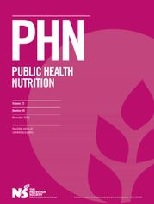The heuristics that guide healthiness perception of ultra-processed foods: a qualitative exploration
Dublin Core
Título
Tema
Abstract
Design: Four focus groups were conducted using a semi-structured discussion guide. Focus group discussions were held about the concept of healthy food, what characterise a healthy product and healthiness perception of ultra-processed products.
Transcripts of the focus groups were analysed following an inductive coding approach.
Setting: Uruguay, one of the Latin American countries with the highest prevalence of overweight and obesity.
Participants: Fifty-two adult Uruguayan participants, diverse in terms of gender, age, educational level and socio-economic status.
Results: In agreement with previous studies on lay perceptions of healthy eating, the conceptualisation of healthy food was mainly focused on food characteristics.
Although participants regarded lack of processing as a cue for healthiness, they did not categorise all ultra-processed products as unhealthy. Albeit some product categories were automatically regarded as unhealthy, participants considered that
other categories could include healthy and unhealthy products. In such cases, they
explicitly referred to several simplified cognitive strategies to judge whether an ultra-processed product is healthy or not. Results showed that participants tended to rely on simple cues, such as label design, nutrient claims, brand, price and country of origin as indicators of product healthiness.
Conclusions: Healthiness perception of ultra-processed products seems to be largely influenced by heuristics, which stresses the need to implement policies that make the potential negative effects of ultra-processed products salient.
Autor
Fuente
Public Health Nutrition: v. 23, no.16, 2020. -- p. 2932–2940
Editor
Fecha
Derechos
Información sobre Derechos de Autor (Por favor lea este aviso antes de abrir los documentos u objetos) La legislación uruguaya protege el derecho de autor sobre toda creación literaria, científica o artística, tanto en lo que tiene que ver con sus derechos morales, como en lo referente a los derechos patrimoniales con sujeción a lo establecido por el derecho común y las siguientes leyes (LEY 9.739 DE 17 DE DICIEMBRE DE 1937 SOBRE PROPIEDAD LITERARIA Y ARTISTICA CON LAS MODIFICACIONES INTRODUCIDAS POR LA LEY DE DERECHO DE AUTOR Y DERECHOS CONEXOS No. 17.616 DE 10 DE ENERO DE 2003, LEY 17.805 DE 26 DE AGOSTO DE 2004, LEY 18.046 DE 24 DE OCTUBRE DE 2006 LEY 18.046 DE 24 DE OCTUBRE DE 2006) ADVERTENCIA - La consulta de este documento queda condicionada a la aceptación de las siguientes condiciones de uso: Este documento es únicamente para usos privados enmarcados en actividades de investigación y docencia. No se autoriza su reproducción con fines de lucro. Esta reserva de derechos afecta tanto los datos del documento como a sus contenidos. En la utilización o cita de partes debe indicarse el nombre de la persona autora.
Formato
Idioma
Tipo
Identificador
Document Item Type Metadata
Original Format
- Fecha de agregación
- October 23, 2020
- Colección
- Bibliografía Nacional Química
- Tipo de Elemento
- Document
- Etiquetas
- Comportamiento del consumidor, Embalaje, Etiquetado, Investigación cualitativa, Política alimentaria, Salud
- Citación
- Machín, Leandro, “The heuristics that guide healthiness perception of ultra-processed foods: a qualitative exploration,” RIQUIM - Repositorio Institucional de la Facultad de Química - UdelaR, accessed July 26, 2024, https://riquim.fq.edu.uy/items/show/6158.
- Archivos

